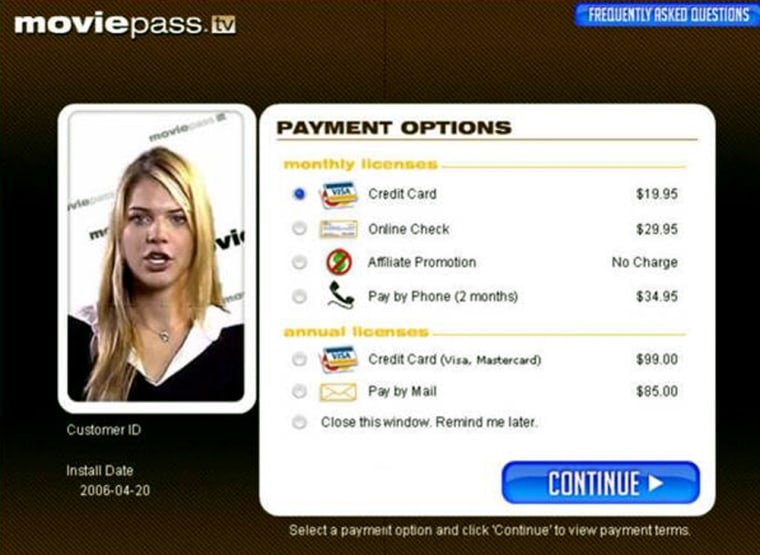Imagine this. You get on your computer and log onto the Internet. Out of nowhere, a pop-up window appears, demanding that you pay for a service you don’t want and didn’t order. And there’s nothing you can do to get rid of it. Now imagine that pop-up keeps coming back every time you boot up or go online.
“It was very annoying,” says Margaret Burton, owner of Tommy’s Nightclub and Grill in Seattle. She got pelted with pop-up ads from an online entertainment site called Movieland.com. Not only did the pop-up take over the whole screen on her office computer, it never gave her a way to contact the company — other than to make a payment.
Washington State Attorney General Rob McKenna says Burton is one of thousands of people across the country who complained their computers were being held “hostage” by Movieland or two other web sites doing the same sort of thing: Popcorn.net and Moviepass.tv.
On Monday, McKenna filed a lawsuit accusing Digital Enterprises, the California company that runs the site, with using an “aggressive, relentless and threatening” form of online bill collection. The Federal Trade Commission has also sued Digital Enterprises, charging it with using an “unfair and deceptive” marketing scheme that violates federal law.
In a news release issued Tuesday, the FTC says most of those who filed complaints “claimed they had never signed up for the 'free trial,' never used Movieland’s services, and never even heard of Movieland until they got their first demand for payment.”
Movieland promotes itself by sending out pop-up ads which offer three days of free access to its members-only content, including thousands of adult movies. The ads say you don’t need to fill out any forms, submit an e-mail address or give a credit card number to begin the free trial. To the average user, the sign-up process would appear to be completely anonymous.
But to take advantage of the offer, you need to download software. That software is really spyware, according to the Washington state lawsuit, designed to give the company access to your computer. If you don’t cancel the service before the three-day trial period ends, the demands for payment begin, in the form of pop-up windows that appear over and over again.
According to the lawsuit, the pop-up takes up much of the computer screen, “obstructs consumers from working in other windows, and lacks any obvious way to permit consumers to minimize or close it.”

The only option is a button marked “continue.” Click that and you launch an audiovisual file which features a woman named Kate, who says you are “legally obligated to purchase a license for the use of the software” that you downloaded for the trial.
The next screen lists various methods for paying. The only other choice is “Close this window. Remind me later.” Click that option and the same series of “payment demands” will continue. The consumer is left with two choices, the lawsuit states: “Make a payment or continue to be harassed” on an hourly basis.
“It’s unconscionable to hold a consumer over a barrel for something he or she has not actually ordered,” says Paula Selis, the assistant attorney general who heads Washington state’s consumer protection high-tech unit.
A lawyer for one of the defendants in this case says the downloads people are complaining about are not spyware and did not get on their computer accidentally.
Attorney Michael Mallow insists these are not "drive-by downloads."
Mallow says the FTC's lawsuit was "improperly brought" and he notes that last week a federal judge in California rejected the FTC's request for a temporary restraining order that would have immediately stopped the company from using its current billing practices. The case now moves to trial, probably in 2008.
The "terms and conditions" outlined on Movieland's Web site warn users that the billing pop-up windows "will appear more frequently until you choose one of the payment options and pay for the license." The Web site gives no instructions for canceling the service or removing the software, and a link to "customer service" is a dead end.
Selis, of Washington state, tells me the pop-up presentation includes very loud music and can last for up to a minute. “So essentially, during the time 'Kate' was speaking and the pop-up was on the computer, you couldn’t use the computer.”
The persistent pop-ups are so annoying, Selis says, many people paid $29.95 or more just to make them go away. “It was harassment, it was intimidation of the consumer,” she says. “It was using a high-pressure tactic to make him or her pay for something they were not legally obligated to pay.”
Here’s another interesting twist. The FTC’s complaint alleges it was “difficult or impossible” for consumers to uninstall the software causing the problem. Trying to remove it using Windows' “Add/Remove Programs” feature does not work. Many consumers had to pay a computer technician to help them, the FTC says.
There's an important lesson in this for everyone. Any time you download software from an unknown company, you could be asking for trouble. That download could contain spyware that opens you to all sorts of nasty surprises.